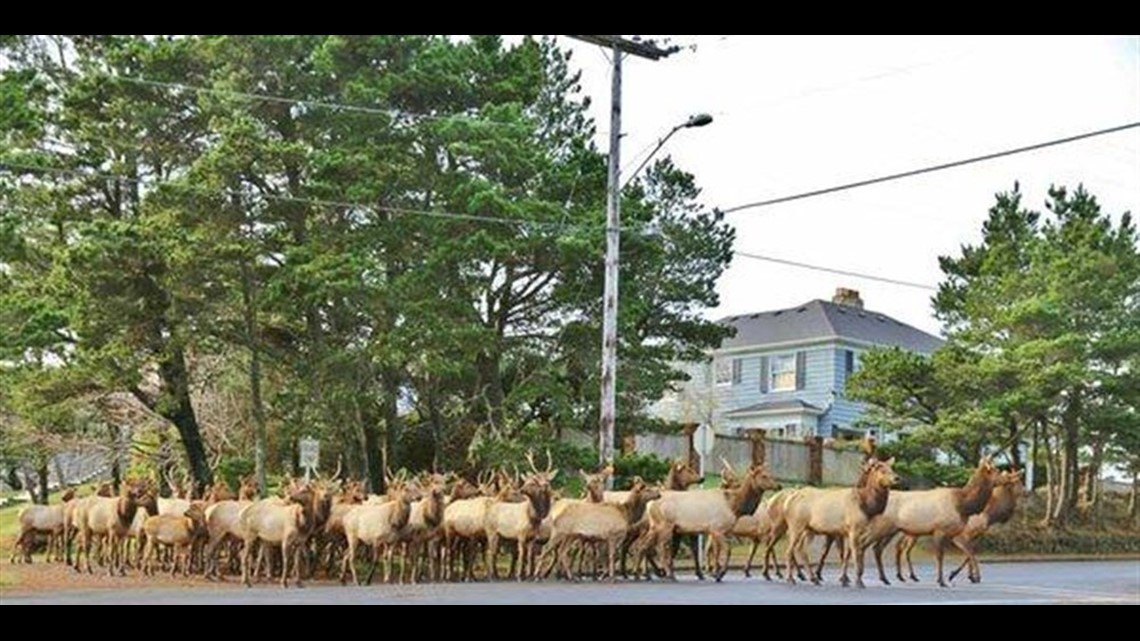GEARHART, Ore. -- The elk herd near the Oregon coastal town of Gearhart has grown from about 30 a decade ago, to around 120 members today.
What was once a charming attraction has now become a problem. And some in the community are wondering whether the herd should be culled.
“They’re beautiful, majestic wildlife, but now they’re just out of control,” said Forrest Goodling. “It’s just a huge problem for the area."
Goodling is in charge of the grounds at Gearhart Golf Links.
Jason Bangild, general manager and director of golf for the course, said the elk are a nuisance on the course, but he’s really worried about the animals around town.
“It's 100 percent, in my mind, about safety,” he said.
Bangild said he has children and worries about what happens if the elk herd gets scared and runs through the school playground while the children are there.
An aggressive mother elk protecting her calf last summer startled residents and tourists.
Many in town are starting to think some of the herd should be moved out, and if that’s not possible, killed.
"It’s really nice to see them. They're fun. Everybody loves seeing them. But elk are big. They're dangerous. And in some places people that are not familiar with them, they get in trouble,” said Harry Dichter.
He grew up in Gearhart and said many people get way too close.
“If that bull decides he doesn’t like you, you're dead. So from that standpoint, I think yes, maybe there's a smaller number that's appropriate around here,” he said.
The City of Gearhart is gathering information about elk encounters but has not asked the state for a permit to kill some of the animals.
It’s an idea that many who live here support.
“Yes. As long as they give the harvest to the food bank or something like that,” said Carol Johansen.
Craig Weston is another local who grew up in Gearhart. He agrees killing some of the herd may be needed to control the problem.
“Yeah, I think it’s probably necessary,” he said.
The elk routinely roam the golf course but also wander through downtown Gearhart.
Some who live there worry it’s just a matter of time before the animals get scared and hurt someone. They hope the town or state, or both, do something before that happens.


The Oregon Department of Fish and Wildlife can issue permits to kill the elk, if the city of Gearhart requests it, said ODFW spokeswoman Michelle Dennehy. The same goes for private land owners.
If permits are granted, the city is responsible for killing the elk, then donating the meat to charity, she said. If the elk are on private land, the city may ask the property owner for permission to kill them.
These are urban elk and the ODFW would not allow them to be moved, she said, due to potential transfer of disease.
Such a move would also disrupt the routines of wildlife already there, she said. Tame elk would simply seek out humans again, recreating the original problem.
Dennehy said cities should pass ordinances forbidding the feeding of elk. In fact, the ODFW plans a meeting in Warrenton, north of Gearhart, where a similar elk problem is unfolding.
The ODFW provides the following tips when encountering elk:
ENJOY WATCHING FROM A DISTANCE. Keep pets on a leash at all times.Try not to disturb elk with sudden movement or loud noises.They are large animals and can pose a danger to themselves and others when startled.
BE AWARE OF YOUR SURROUNDINGS to avoid surprising a herd of elk by walking into the middle of them.
Elk are most active at dawn and dusk and most aggressive during breeding and calving seasons. Watch out for them at dawn and dusk along roadways and migration routes. Stay away and keep pets away at all times but especially during the breeding season (September/October) and calving season (May/June) when elk become more territorial.
NEVER PICK UP AN ELK CALF OR ANY OTHER YOUNG WILDLIFE. It’s against the law and bad for the animal. If you encounter a young animal alone, leave it be, or if it is in distress or you are concerned, call the police or nearest ODFW office.
NON-NATIVE VEGETATION ATTRACTS ELK, especially in the winter when other food sources are scarce. To move a herd off your property, calmly approach the herd, making your presence obvious. Avoid surprising or being aggressive toward any wildlife.
For more information, contact the Oregon Department of Fish and Wildlife, Wildlife Division at 503-947-6000

